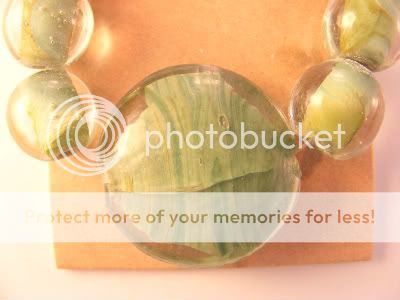
(Flameworked glass beads by Cindy Gimbrone)

(Fused glass gem by Lynn Davis)
When buying glass beads and/or fused glass one important feature handmade glass art beads typically have that craft store beads don’t have is artists will kiln anneal their glass beads.
Why should you care about kiln annealing? Kiln annealing strengthens glass by allowing the glass to cool very, very, very slowly. If properly done, it relieves any stress in the glass and the beads won’t crack.
Below is a picture of a set of glass beads I purchased at a local craft store:
As a glass beadmaker, I know by where the crack is, that the bead has not been kiln annealed. A crack along the bead hole means the glass cooled too quickly. Glass cools too quickly when it hasn’t been placed in a heated kiln.
Here’s a picture of me placing a hot glass bead into my heated kiln to anneal. Notice the temperature on the kiln reads 968 Fahrenheit, the proper temperature to anneal soda lime glass. (Ignore the hat and sweatshirt, it was the winter and my studio is unheated.) My kiln has an automatic cut off switch so when I open it, the electricity to the kiln shuts off. An important safety feature as are my safety glasses, my kevlar gloves and leather apron.
Did you know a properly annealed glass bead will bounce rather than break when dropped on the floor? Although I don’t recommend you start dribbling your glass beads, I have dropped them on my concrete floor by accident and they do bounce.
So when buying art glass beads, check to for the words “kiln annealed” to ensure your treasure will last a lifetime.
Written by Cindy Gimbrone, glass beadmaker, who’s accidentally bounced many beads off her studio floor.



CreekHiker
July 29, 2008 at 5:43 pmAwesome post Cindy! This is so important and I feel a large part of my job as a bead maker is to educate my customers. Thanks for spreading the word!
Lori g
July 29, 2008 at 7:01 pmGreat post Cindy!
And the thing about those store-bought glass beads? Even if you examine them for cracks when you buy them and you don’t see any…if they’re not annealed, the cracks can show up days, weeks, MONTHS later!
AJ
July 29, 2008 at 7:47 pmThank you for sharing this important information!
A lot of the lampwork and fused pieces that are showing up in craft stores are very pretty looking, and I’m sure the prices are appealing, but you simply can’t trust them. A friend sent some to me and the little hanging loops busted in transit.
Beth
July 29, 2008 at 8:01 pmI’m not normally big on the color orange, but your first bead photo has me drooling! Am off to check out the orange beads in my stash…
Cindy Gimbrone
July 29, 2008 at 10:58 pmThanks, Creek Hiker, Lori and AJ! We just need to keep talking about annealing and how it’s important when you’re buying art beads. We’re all getting the word out.
Cindy
Cindy Gimbrone
July 29, 2008 at 10:59 pmHi Beth!
Glad you found the beads yummy. I love that shade of orange – hope you find some good orange beads in your stash!
Cindy
Suanough
July 30, 2008 at 3:47 pmHi Cindy,
I truly love your work and have been at fault for not letting you know that… sorry.
Thanks for the spot about annealing. I am new to buying lampwork and need all the direction I can get!
Suanough
AArdvaark Braid Designs, Katy TX
Cindy Gimbrone
July 30, 2008 at 11:25 pmHi Suanough,
Thank you! I appreciate your taking the time to comment 🙂
Yes, annealing is something we can’t see but soooo critical to quality glass.
Come back again and comment – love hearing from you!
Cindy
Fridman
February 2, 2011 at 9:06 amI can understand what you saying about cracks. In smaller work you are correct but in bigger works sometimes the cracks is part of the work.